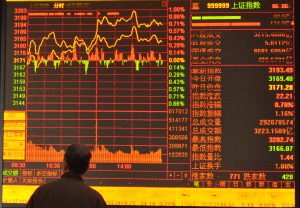For China’s leadership, this summer has been challenging on multiple fronts. In politics, opaque circumstances led to the removal of the former foreign minister. In the military, two top generals have been purged amid rumors of corruption and leaking secrets. In foreign affairs, ties with Washington continue to languish. And at home, floods brought devastation to parts of northern China, prompting criticism of the government’s response.
But one sphere above all is seen as creating a headache for Beijing: the economy. China’s anticipated post-pandemic rebound has faltered amid a lack of consumer confidence and investor sentiment that seems to worsen with every data release – from a faster-than-expected drop in trade to consumer deflation and record youth unemployment.
A principal problem is the liquidity crisis in China’s property sector, for decades a key engine of economic growth. Missed payments by real estate developer Country Garden and trust company Zhongrong have sparked fears that a wave of defaults could follow. Such bearish signals have led global investment banks to lower their outlooks for Chinese equities and the country’s overall economic performance.
From my vantage point in Shanghai, the sense of doom and gloom has been palpable. This year was supposed to mark the country’s post-COVID comeback at the start of President Xi Jinping’s third term in power. Instead, China’s economic performance has underwhelmed on almost every metric.
Beijing has acknowledged that the current trajectory is unsatisfactory and attempted some remedial action. Since January, a string of rate cuts, eased restrictions on property purchases and stock market support measures have all sought to boost China’s underperforming economy. In late July, the Politburo signaled more support for real estate, while a Xi speech published this month called for “historic patience” amid the ongoing economic stress.
Yet these moves have been marginal and, to a large extent, more rhetorical than substantive. The lack of a major stimulus package shows that there are limits to Beijing’s concern about its economic predicament and its resolve to take action. GDP growth remains in the region of acceptability for China’s leadership, and social unease has not yet worsened to politically worrying levels.
Taking the long view, Beijing sees present challenges as a period of necessary adjustment along the road to a new economic normal. Under its New Development Concept, the Chinese Communist Party is moving away from a “growth-first” mindset, supplanting what Xi calls “disorderly capital expansion” with “higher-quality” development. This is one rationale for why the authorities aren’t pulling the trigger on a stimulus.
But I perceive a more fundamental reason for the inaction: Recent economic indicators are not only acceptable to Beijing, but in fact align with its long-term political interests. If China’s economy were to return to high levels of growth through capitalist mechanisms, the relevance of a nominally “communist” ruling party would increasingly be in doubt.
Rather than fret about China getting stuck in a middle-income trap, China’s political elite likely feels more threatened by the prospect of an ever-larger upper-middle class. Capping individual and corporate wealth creation is a way to extend the dominance of a party that otherwise risks losing its relevance. In effect, stemming economic expansion ought now to be seen as a feature of China’s political-economic system, not a bug.
To be sure, Beijing is not happy with the country’s economic underperformance and associated social malaise. Increasing numbers of young people and urbanites are either out of work or disillusioned with their career and life prospects, choosing to “lie flat.” The party knows that losing the confidence of the current generation could eventually turn into a crisis of political legitimacy.
Beijing is also concerned about the negative optics of a downturn, and has sought to curtail adverse reporting on China’s economy. Investors are reportedly being cold-called by state media desperate for positive takes, while leading business figures like Tencent’s Ma Huateng have been enlisted to publicly approve government support plans. (Ma has previously spoken out about the challenging conditions facing Chinese companies.)
But this concern for the optics of a troubled economy will not necessarily morph into the large stimulus package that some economists have called for. Measures such as cash handouts would contradict the spirit of Xi’s economic governance approach, with its emphasis on sustainability and “struggle.” Wealth transfers could also tilt the political power balance toward households, running counter to Xi’s statist philosophy.
This political logic should act as a counterweight to Beijing launching major economic stimulus, at least in the near term. The longer term, of course, remains less certain. If the government does eventually inject large-scale fiscal or monetary stimulus, it is more likely to be forced by a major economic crisis or spike in social discontent, rather than through a proactive policy pivot.
The COVID-19 crisis of recent years offers useful comparability. In handling both that crisis and the current economic challenges, Beijing has lacked good options for balancing its seemingly conflicting policy goals. To compensate, the leadership has issued messages of reassurance, publicly acknowledging hardships and releasing various multi-point plans.
In the same way that analysts were last year fixated on finding signs of an end to the “zero COVID” policy, observers are now closely watching for some sort of economic U-turn. And just as Beijing ultimately stopped releasing unfavorable pandemic data, the government has now decided to withdraw certain unsightly economic indicators, notably for youth unemployment and land sales.
Ultimately, the limits of zero COVID were reached when rare nationwide protests preempted a swift policy pivot. The limits of economic inaction have similarly started to be tested by investor protests and a rise in labor unrest.
But overall, the current economic problems have not yet had a significant impact on social stability. And until such a moment is reached, there remains little political reason for Beijing to bail out its beleaguered economy.

































